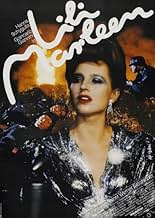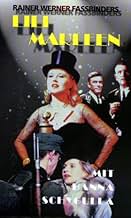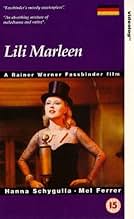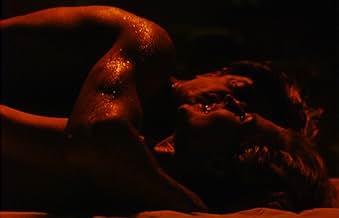IMDb रेटिंग
7.1/10
4.6 हज़ार
आपकी रेटिंग
अपनी भाषा में प्लॉट जोड़ेंIn 1938, a German singer falls in love with a Jewish composer in Zurich, who helps Jews flee Nazi Germany. She wants to help but is forced back to Germany. Her song "Lili Marleen" becomes a ... सभी पढ़ेंIn 1938, a German singer falls in love with a Jewish composer in Zurich, who helps Jews flee Nazi Germany. She wants to help but is forced back to Germany. Her song "Lili Marleen" becomes a hit with soldiers and the Nazi top brass.In 1938, a German singer falls in love with a Jewish composer in Zurich, who helps Jews flee Nazi Germany. She wants to help but is forced back to Germany. Her song "Lili Marleen" becomes a hit with soldiers and the Nazi top brass.
- पुरस्कार
- 1 जीत और कुल 4 नामांकन
Karl-Heinz von Hassel
- Henkel
- (as Karl Heinz von Hassel)
Raúl Gimenez
- Blonsky
- (as Raul Giminez)
फ़ीचर्ड समीक्षाएं
Even though Lili Marleen's events take place right before, during and up to the end of World War II, it is a movie centered around people and their feelings in typical Fassbinder fashion.
It is the story of Willie (played by the stunning Hanna Schygulla) and with her the story of Nazi Germany that follows a similar trajectory. She is a German that tries to make a living in Zurich as a singer/cabaret artist and falls in love with Robert (Giancarlo Giannini), a Jew and member of the anti-Nazi resistance camp. His family doesn't approve of their relationship, because she is German/Aryan and make sure they go their separate ways after her deportation. Back in Germany, she must find a way to survive and, seemingly out of nowhere, her song "Lili Marleen" becomes a monumental hit, a source of inspiration and courage for every German soldier, which brings Willie in a tricky spot, as it becomes harder and harder to maintain the balance between collaborating with the Nazis in an artistic level and taking part in the resistance against them all the while hoping for a reunion with Robert which seems more and more unlikely.
An interesting element of the movie is that it presents both sides in a nuanced way, it avoids portraying the Nazis as the one-dimensional caricature villains. It also shows how thin the lines are and how hard it can be to fight prejudice and shake off a social or political stigma.
And of course the song itself deserves its legendary status.
It is the story of Willie (played by the stunning Hanna Schygulla) and with her the story of Nazi Germany that follows a similar trajectory. She is a German that tries to make a living in Zurich as a singer/cabaret artist and falls in love with Robert (Giancarlo Giannini), a Jew and member of the anti-Nazi resistance camp. His family doesn't approve of their relationship, because she is German/Aryan and make sure they go their separate ways after her deportation. Back in Germany, she must find a way to survive and, seemingly out of nowhere, her song "Lili Marleen" becomes a monumental hit, a source of inspiration and courage for every German soldier, which brings Willie in a tricky spot, as it becomes harder and harder to maintain the balance between collaborating with the Nazis in an artistic level and taking part in the resistance against them all the while hoping for a reunion with Robert which seems more and more unlikely.
An interesting element of the movie is that it presents both sides in a nuanced way, it avoids portraying the Nazis as the one-dimensional caricature villains. It also shows how thin the lines are and how hard it can be to fight prejudice and shake off a social or political stigma.
And of course the song itself deserves its legendary status.
It is based on the song Lili Marleen, sung by Lale Andersen, and her romance with Rolf Liebermann in the movie Willie and Robert. The film tried to be very impartial in relation to Lale and Nazism, although she helped discreetly, and for Robert, the Allies, however in the end, she ended up surrendering to Nazism, to continue singing, to leave the Black List, had to change her famous song with a military air, she didn't marry Rolf, but kept an eternal friendship, could have done better...
Rainer Werner Fassbinder always made movies as if he knew his was on borrowed time. Many of the 44 films made by him in his 16-year career represent searches, experiments, attempts to express himself as an artist in the most diverse cinematic ways. 'Lili Marleen', made in 1981, the penultimate year of his life, belongs to a cluster of several films that are apparently less radical than most of the others and closer to mainstream cinema. After the success of some of his movies in previous years, Fassbinder was able to secure financing for more expensive productions with international casts and many extras. He chooses to make 'Lili Marleen', a story woven around the famous song that sounded in the trenches of the Second World War, both German and Allied (one of the famous versions belongs to Marlene Dietrich) and somewhat inspired by the autobiographical book of Lale Andersen, the German singer who first recorded the song on disc. Apparently, it is a melodrama that improbably embellishes her biography. In fact, we also find in this film the story of a woman who has to face alone the dark forces of the surrounding society combined with Fassbinder's sarcastic vision of the history of 20th century Germany.
The film's lead character, Willie, is a blonde, Aryan, German singer who doesn't seem to know or care much about what's going on in Germany in 1938. She performs in a cabaret in Zurich and falls in love with Robert, a wealthy young Jew, whose family is involved in the anti-Nazi resistance fight and in the rescue of the remaining Jews in Germany. Willie's father opposes the relationship and maneuvers so that the young woman cannot return to Switzerland after a trip to Germany. Forced to earn a living in Nazi Germany, Willie records the song 'Lili Marleen', which after the outbreak of war and the occupation of much of Europe and North Africa by the Nazis becomes a hit listened to by German soldiers and later by the Allies when they will disembark in Europe. The relationship between Willie and Robert continues, and the singer, forced to make artistic compromises and collaborate with the Nazis, begins to open her eyes and get involved in the fight against Nazism.
As in many of Fassbinder's films, the female characters are much stronger, more nuanced and better defined than the male characters. The lead role is interpreted by the exceptional Hanna Schygulla, Fassbinder's favorite actress. Her Willie is carefree at first, eager to live her life, a fighter for survival using her art and feminine charms as weapons. Above all, however, she is in love, but times of war crush destinies and love stories. Robert and his father are ambiguous characters and Fassbinder has been criticized for this, but also for nuancing the characters on the other side of the conflict, the Nazi officers. My opinion is that artistically the choice was appropriate, and the film must be seen from the director's sarcastic perspective, fascinated but also critical of the anti-cultural kitsch of 20th century Germany. As in many of his other films, Fassbinder also appears in a cameo role, as head of the anti-Nazi resistance, perhaps also to emphasize his personal position. 'Lili Marleen' is a film less appreciated by critics and Fassbinder experts. I consider it among his best films.
The film's lead character, Willie, is a blonde, Aryan, German singer who doesn't seem to know or care much about what's going on in Germany in 1938. She performs in a cabaret in Zurich and falls in love with Robert, a wealthy young Jew, whose family is involved in the anti-Nazi resistance fight and in the rescue of the remaining Jews in Germany. Willie's father opposes the relationship and maneuvers so that the young woman cannot return to Switzerland after a trip to Germany. Forced to earn a living in Nazi Germany, Willie records the song 'Lili Marleen', which after the outbreak of war and the occupation of much of Europe and North Africa by the Nazis becomes a hit listened to by German soldiers and later by the Allies when they will disembark in Europe. The relationship between Willie and Robert continues, and the singer, forced to make artistic compromises and collaborate with the Nazis, begins to open her eyes and get involved in the fight against Nazism.
As in many of Fassbinder's films, the female characters are much stronger, more nuanced and better defined than the male characters. The lead role is interpreted by the exceptional Hanna Schygulla, Fassbinder's favorite actress. Her Willie is carefree at first, eager to live her life, a fighter for survival using her art and feminine charms as weapons. Above all, however, she is in love, but times of war crush destinies and love stories. Robert and his father are ambiguous characters and Fassbinder has been criticized for this, but also for nuancing the characters on the other side of the conflict, the Nazi officers. My opinion is that artistically the choice was appropriate, and the film must be seen from the director's sarcastic perspective, fascinated but also critical of the anti-cultural kitsch of 20th century Germany. As in many of his other films, Fassbinder also appears in a cameo role, as head of the anti-Nazi resistance, perhaps also to emphasize his personal position. 'Lili Marleen' is a film less appreciated by critics and Fassbinder experts. I consider it among his best films.
Story of a song. And what song! In fact, the creation of Hans Leip and Norbert Schultze is the only character, a spell who creates existences, loves, tragedies with a sarcastic indifference. It is an obsessive music, soul of a ambiguous time of dreams and ideas intoxication, with old words and cruels ambitions.
Certainly, it is a Fassbinder's lesson about values and lies, about rules of war and feelings, about small victims and sacrifice.
Hanna Schygulla is gorgeous in a character's skin different of Lale Anderson or Marlene Dietrich but with the same art to describe the atmosphere of extincted space. In some moments I saw in parts of film elements of "Cabaret" Nazi song or "Satyricon" dances. It is normal: interpretation of song is not only piece of a show but rule of life. "Lili Marleen" is not the old "Das Lied eines Jungen Soldaten auf der Wacht" but hard of an universe, hypocrite, coward, frail.
The final meeting between Willie and Robert is only seal of ordinary tragedy. To late, to far.
Certainly, it is a Fassbinder's lesson about values and lies, about rules of war and feelings, about small victims and sacrifice.
Hanna Schygulla is gorgeous in a character's skin different of Lale Anderson or Marlene Dietrich but with the same art to describe the atmosphere of extincted space. In some moments I saw in parts of film elements of "Cabaret" Nazi song or "Satyricon" dances. It is normal: interpretation of song is not only piece of a show but rule of life. "Lili Marleen" is not the old "Das Lied eines Jungen Soldaten auf der Wacht" but hard of an universe, hypocrite, coward, frail.
The final meeting between Willie and Robert is only seal of ordinary tragedy. To late, to far.
Yes, there is such a thing, despite the fact that IMDb does not currently list it.
This film is a clever examination of how hard it was NOT to become part of the Nazi system. Willie is a German singer, in love with a Swiss Jewish conductor. She returns to Germany to help her lover with the resistance, however his father - who disapproves of their relationship - has arranged that she will not be able to return to Switzerland. Stranded in Berlin, Willie is forced to use a Nazi connection just to get some work...and he just happens to be the newly appointed Cultural Director. So Willie is given the opportunity to perform and record 'Lili Marleen'. The song becomes a hit, and Hitler becomes a fan. I won't go into the rest of the plot, but be assured that there are twists and turns.
By the end of this movie, you will not be able to get the song 'Lili Marleen' out of your head as it is repeated countless times. Believe me, I saw the film last week, and I am still singing it.
This film is a clever examination of how hard it was NOT to become part of the Nazi system. Willie is a German singer, in love with a Swiss Jewish conductor. She returns to Germany to help her lover with the resistance, however his father - who disapproves of their relationship - has arranged that she will not be able to return to Switzerland. Stranded in Berlin, Willie is forced to use a Nazi connection just to get some work...and he just happens to be the newly appointed Cultural Director. So Willie is given the opportunity to perform and record 'Lili Marleen'. The song becomes a hit, and Hitler becomes a fan. I won't go into the rest of the plot, but be assured that there are twists and turns.
By the end of this movie, you will not be able to get the song 'Lili Marleen' out of your head as it is repeated countless times. Believe me, I saw the film last week, and I am still singing it.
क्या आपको पता है
- ट्रिवियाShot in English for American distribution; later dubbed in German
- गूफ़Kaufmann, the German officer who arrests Robert on the train, wears the uniform of an SS-Gruppenfuhrer (General) - it is highly unlikely that an SS General of such rank would be checking identity papers at random on a train.
- कनेक्शनFeatured in Century of Cinema: Die Nacht der Regisseure (1995)
- साउंडट्रैकLili Marleen
(German Version)
(based on a poem from the 1915 book "Die kleine Hafenorgel" by Hans Leip)
Music By Norbert Schultze,
Vocals Hanna Schygulla
(p) 1981 Schlicht Musikverlag, Phonogram, GmbH, DRG Records, Inc., Philips
© Metropolis Records
Published By Brampton Music Ltd., Chappell Music Ltd., Peter Maurice Music,
EMI Music
टॉप पसंद
रेटिंग देने के लिए साइन-इन करें और वैयक्तिकृत सुझावों के लिए वॉचलिस्ट करें
- How long is Lili Marleen?Alexa द्वारा संचालित
विवरण
- रिलीज़ की तारीख़
- कंट्री ऑफ़ ओरिजिन
- भाषाएं
- इस रूप में भी जाना जाता है
- La vida íntima de Lili Marleen
- फ़िल्माने की जगहें
- उत्पादन कंपनियां
- IMDbPro पर और कंपनी क्रेडिट देखें
बॉक्स ऑफ़िस
- बजट
- DEM 1,05,00,000(अनुमानित)
- US और कनाडा में सकल
- $8,144
- US और कनाडा में पहले सप्ताह में कुल कमाई
- $11,623
- 16 फ़र॰ 2003
- दुनिया भर में सकल
- $8,158
- चलने की अवधि2 घंटे
- ध्वनि मिश्रण
- पक्ष अनुपात
- 1.66 : 1
इस पेज में योगदान दें
किसी बदलाव का सुझाव दें या अनुपलब्ध कॉन्टेंट जोड़ें



































